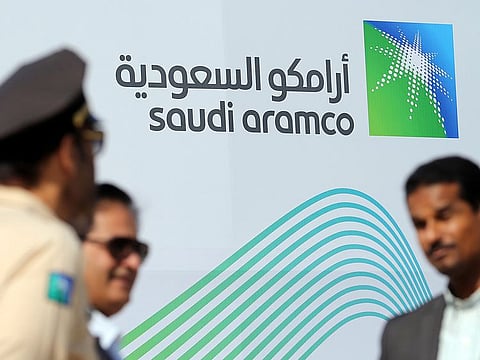Aramco IPO set to be a success among Saudis, but who’s next?
Key questions: Will hopes of a blockbuster sale be met? Will there be a major investor?

Dubai: The much-awaited share sale of Saudi Aramco, which will see 1.5 per cent of the world’s biggest oil producer floated on the Saudi Stock Exchange, is nearing the end with one detail left to be revealed — who would be the key investor?
A little over 2.8 billion Aramco shares have been issued so far, according to data released by lead manager Samba Capital, with 80 per cent of it subscribed in just the first five days of the offering.
With 3 billion shares in the company up for sale, two billion shares were offered to institutional investors while the rest was for retail. Investor subscriptions have brought in about $24.3 billion so far, in an IPO targeted to raise between $24.5 billion to $25.5 billion in total.
“We see the IPO succeeding despite the rumours that it would be undersubscribed as the demand is enough to cover the IPO in the first week of its launch,” said Mohamed Zidan, Chief Market Strategist for ThinkMarkets in Dubai. “For the demand I think it will be oversubscribed but not by large percentage.”
Any big investors?
With 150 million shares left to be bought, the oil titan is in search of a cornerstone investor.
In recent weeks, the company has reportedly met officials from the state-owned Investment Corporation of Dubai, the Abu Dhabi Investment Authority (Adia), the Kuwait Investment Authority and GIC, Singapore’s sovereign wealth fund.
“The regional visit by Aramco to market their IPO to the major sovereign funds in GCC — it is just a regional and local roadshow,” Zidan said. A few media reports suggested that the Adia is looking to invest at least $1 billion.
Aramco did not market its domestic IPO abroad and called off its investor roadshows in New York and London. Analysts said one of the reasons why Aramco, officially Saudi Arabian Oil Co, kept the IPO local is because the firm saw adequate local and regional demand for what is offered. “We can consider it just the first stage in the offering, where later stages we may see the international offering,” Zidan added.
Another reason may be because the company hopes to get the IPO priced at the upper band of the suggested price after being valued by Saudis and regional sovereign funds, the analyst said. “International investors now are cautious, and assuming risks and uncertainty more than what makes sense which would push the valuation lower.”
The shares were priced between 30-32 Saudi riyals, or $8-$8.5, providing the company a valuation of between $1.6 trillion and $1.7 trillion. When Crown Prince Mohammed bin Salman first proposed the idea of listing Aramco in 2016, he hoped of achieving a valuation of $2 trillion.
“Preparations for the public listing of Saudi state oil company, Aramco, have stepped up a gear this month but the signs are that it is unlikely to be the blockbuster sale that the Kingdom once hoped for,” said William Jackson, chief emerging-markets economist at Capital Economics, adding that investor interest has not been as strong as expected as it now looks set to be a largely Saudi affair.
Touch-and-go
Aramco’s offering is set to challenge Chinese e-commerce giant Alibaba’s fame for being the world’s biggest IPO at $25 billion.
“It’s now touch and go whether the sale will beat the record set by Alibaba and the proceeds would barely cover the budget deficit for a year,” Jackson added. “And plans for this sale to be followed by an international listing seem to have lost momentum.”
The timing of the IPO raised eyebrows too. Aramco pumps about 10 per cent of the world’s oil, but crude prices have fallen 16 per cent in the past year and growth outlook suggests it may drop further. An aerial attack on Aramco’s largest processing plant in mid-September also highlighted its vulnerability as well as the region’s heightened geopolitical tensions.
However, analysts said the IPO will be driven by investor confidence in Aramco’s dividend plans, financials and cash flow. Samba Capital’s vice-chair Rania Nashar said the retail demand is an indication of strong confidence among Saudi citizens in the company’s financial position.
“Aramco fundamentals are strong compared to its international peers,” Zidan said. “Some would suggest investing in the company stock could be consider like bond’s characteristics, not as an equity — which is more secure than stocks.”
Sign up for the Daily Briefing
Get the latest news and updates straight to your inbox

